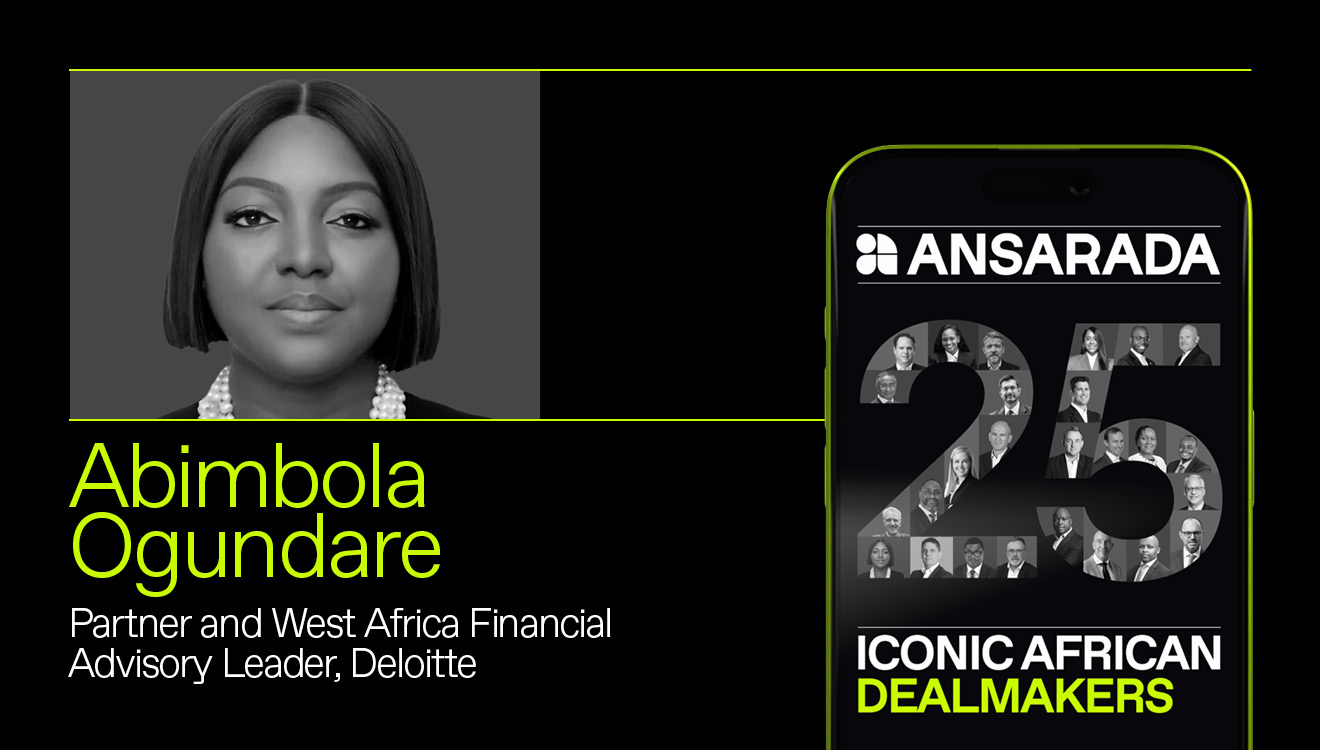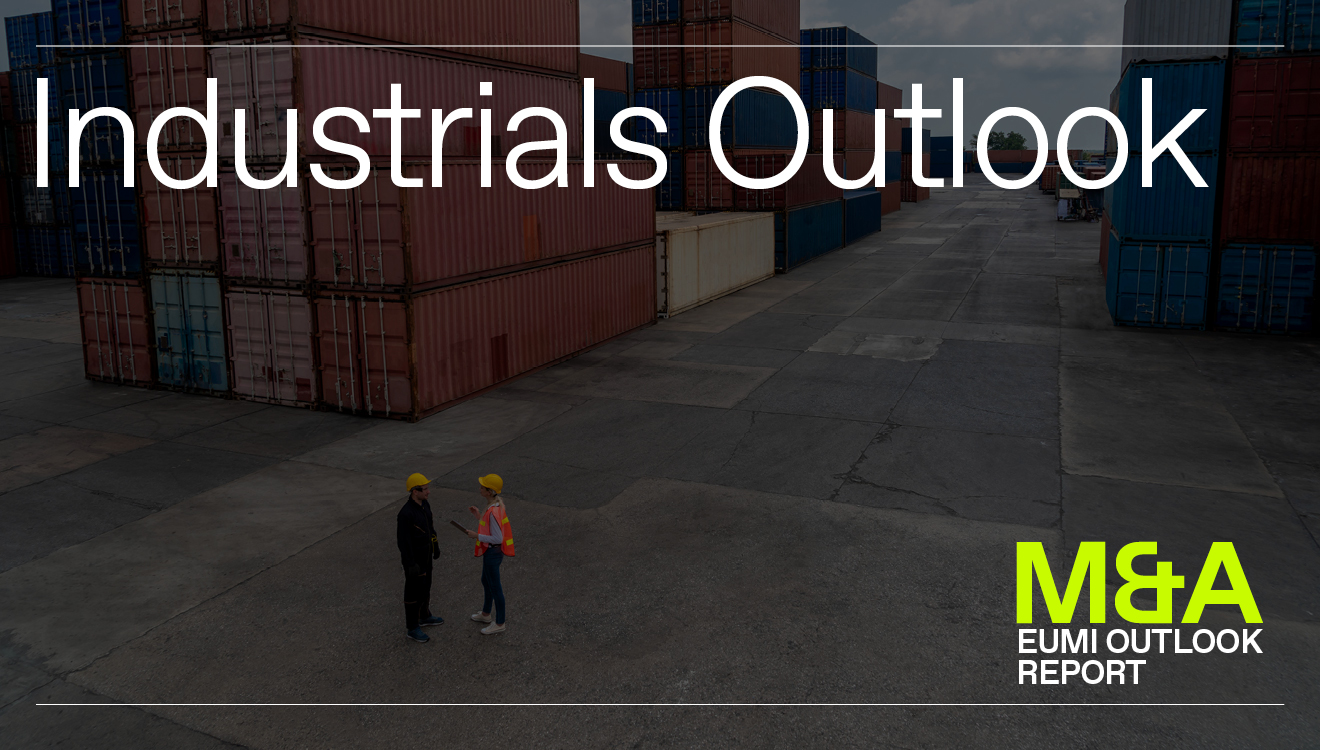Abimbola Ogundare on trust, transformation, and the art of African M&A
With nearly two decades of experience in dealmaking across Africa, Abimbola Ogundare has built a reputation as a dynamic leader in financial advisory and corporate finance. As the head of Deloitte’s Africa Corporate Finance (excluding South Africa) division, she is deeply committed to driving sustainable growth in the continent’s most impactful sectors. Her expertise spans the full spectrum of M&A, from strategy validation and valuations to due diligence, restructuring, and deal execution. Driven by a passion for empowering businesses through transformative strategies, Abimbola combines hands-on deal experience with a visionary approach to Africa’s evolving investment landscape. Armed with an Executive MBA from London Business School, she brings both insight and innovation to navigating the complexities of corporate finance on the continent.
By AnsaradaThu Apr 17 2025Mergers and acquisitions, Due diligence and dealmaking, Advisors

With nearly two decades of experience in dealmaking across Africa, Abimbola Ogundare has built a reputation as a dynamic leader in financial advisory and corporate finance. As the head of Deloitte’s Africa Corporate Finance (excluding South Africa) division, she is deeply committed to driving sustainable growth in the continent’s most impactful sectors. Her expertise spans the full spectrum of M&A, from strategy validation and valuations to due diligence, restructuring, and deal execution. Driven by a passion for empowering businesses through transformative strategies, Abimbola combines hands-on deal experience with a visionary approach to Africa’s evolving investment landscape. Armed with an Executive MBA from London Business School, she brings both insight and innovation to navigating the complexities of corporate finance on the continent.
In this Q&A, she reflects on the key trends shaping Africa’s M&A environment, the challenges and opportunities ahead, and how businesses can position themselves for long-term success.
What initially drew you to corporate finance and M&A?
Was there a defining moment or person who inspired you to enter the field? I began my career in investment banking and subsequently transitioned into core banking, where I spent about three years before moving into consulting. Consulting was fantastic, offering me the breadth to explore various themes, including M&A, early in my career. Over time, M&A has naturally become central to my work over the past two decades.
In terms of inspiration, several senior colleagues and mentors have played significant roles along the way. Two or three stand out as invaluable sounding boards, and I still rely on their insights today.
Reflecting on your journey, what core values or guiding principles have shaped the way you approach dealmaking, particularly in the African context?
Three things come to mind. First, it’s critical to have the patience to truly understand what the deal means to each party at the table. Deals are inherently multi-faceted— what might be a simple divestment of a non-performing asset for the seller could be a transformative acquisition or status symbol for the buyer. Second, great deals are built on trust—whether through referrals, credentials, or relationships. Building a strong track record is essential. Finally, thorough deal preparation is vital to preserve shareholder value.
Could you share a challenging project and the lessons it taught you?
One deal that stands out spanned just over a year and involved a top-three player in the financial sector during the local banking recapitalization exercise. Managing regulatory oversight and negotiating SPAs required precise messaging and extensive regulator engagement
Interestingly, at one point, progress was made by having the buyer and seller step away from the advisors for a direct discussion on non-negotiables. While advisors may not always like this approach, it sometimes helps resolve critical points. Once the buyer and seller reach an understanding, advisors can step back in to ensure risks are appropriately managed, and agreements are well-structured.
Is there a career-defining deal that shaped your professional trajectory?
One deal that stands out involved bridging a disconnect between a seller’s management and board, which risked derailing the transaction. By engaging both parties separately to build trust and alignment, we closed the deal within a month. This experience highlighted the importance of internal alignment and reinforced the value of understanding all stakeholders’ perspectives.
Have you worked on any transaction that significantly transformed a company or industry in West Africa?
Yes, a deal that redefined the pensions ecosystem in West Africa comes to mind. The transaction consolidated the position of a top-tier player, strengthened the regional pension space, and enhanced trust in long-term asset management. A vibrant pension sector is crucial—it boosts employee morale, drives economic growth, and safeguards futures.
From your vantage point at Deloitte, what key trends have shaped the M&A landscape over the last two decades?
Growth has been remarkable. Deal sizes and activity pipelines have expanded significantly, driven by natural resources, government reforms, deregulations, and privatizations. Emerging asset classes like FDIs, private equity, private debt, and venture capital have also gained traction. However, recent economic slowdowns and currency devaluation have prompted corporates to reconsider their portfolios, creating divestment opportunities for local players.
Which sectors or industries are poised for the most deal activity in the coming years?
Financial services, technology/ telecoms, energy and renewables, and agriculture processing will see significant activity. Regulatory changes will drive M&A in financial services and energy. The tech sector, particularly digital infrastructure and agri-tech, will expand to support Africa’s growing population and address food security gaps.
How are dealmakers addressing currency risks and structuring deals creatively to overcome challenges?
While devaluation impacts short-term investments, long-term investors view it as an opportunity for cost-effective asset acquisition. With macroeconomic stability expected in 2025, I’m optimistic that investor confidence will grow, driving increased FDIs and deal activity.
What advice would you give aspiring dealmakers looking to make their mark in Africa?
Dealmaking is as much an art as it is a science. Learn the fundamentals, find a good mentor, and give yourself time to grow. Be patient, put in the work, and strive to master the art of dealmaking over time.


